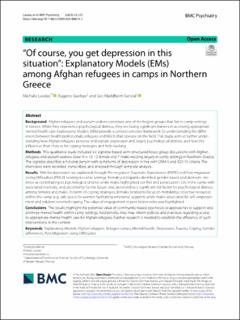| dc.contributor.author | Lavdas, Michail | |
| dc.contributor.author | Guribye, Eugene | |
| dc.contributor.author | Sandal, Gro Mjeldheim | |
| dc.date.accessioned | 2023-04-28T11:35:31Z | |
| dc.date.available | 2023-04-28T11:35:31Z | |
| dc.date.created | 2023-04-26T10:47:01Z | |
| dc.date.issued | 2023 | |
| dc.identifier.issn | 1471-244X | |
| dc.identifier.uri | https://hdl.handle.net/11250/3065548 | |
| dc.description.abstract | Background: Afghan refugees and asylum seekers constitute one of the largest groups that live in camp settings in Greece. While they experience psychological distress, they are facing significant barriers in accessing appropriate mental health care. Explanatory Models (EMs) provide a context-sensitive framework for understanding the differences between health professionals, refugees and NGOs that operate on the field. This study aims at further understanding how Afghan refugees perceive and explain depression and largely psychological distress, and how this influences their choices for coping strategies and help-seeking.
Methods: This qualitative study included six vignette-based semi-structured focus-group discussions with Afghan refugees and asylum-seekers (total N = 19, 12 female and 7 male) residing largely in camp settings in Northern Greece. The vignette describes a fictional person with symptoms of depression in line with DSM-5 and ICD-10 criteria. The interviews were recorded, transcribed, and analysed through template analysis.
Results: EMs for depression are explained through Pre-migration Traumatic Experiences (PMTE) and Post-migration Living Difficulties (PMLD) relating to camp settings. Female participants identified gender-based and domestic violence as contributing to psychological distress while males highlighted conflict and persecution. Life in the camp with associated inactivity, and uncertainty for the future, was perceived as a significant risk factor for psychological distress among females and males. In terms of coping strategies, females tended to focus on mobilizing collective resources within the camp (e.g. safe space for women facilitating emotional support), while males advocated for self-empowerment and solution-oriented coping. The value of engagement in peer helper-roles was highlighted.
Conclusions: The results highlight the potential value of community-based psychosocial approaches to support and promote mental health within camp settings. Additionally, they may inform policies and practices regarding access to appropriate mental health care for Afghan refugees. Further research is needed to establish the efficiency of such interventions in this context. | en_US |
| dc.language.iso | eng | en_US |
| dc.publisher | BMC | en_US |
| dc.rights | Navngivelse 4.0 Internasjonal | * |
| dc.rights.uri | http://creativecommons.org/licenses/by/4.0/deed.no | * |
| dc.title | “Of course, you get depression in this situation”: Explanatory Models (EMs) among Afghan refugees in camps in Northern Greece. | en_US |
| dc.type | Journal article | en_US |
| dc.type | Peer reviewed | en_US |
| dc.description.version | publishedVersion | en_US |
| dc.rights.holder | Copyright 2023 The Author(s) | en_US |
| dc.source.articlenumber | 125 | en_US |
| cristin.ispublished | true | |
| cristin.fulltext | original | |
| cristin.qualitycode | 2 | |
| dc.identifier.doi | 10.1186/s12888-023-04613-2 | |
| dc.identifier.cristin | 2133166 | |
| dc.source.journal | BMC Psychiatry | en_US |
| dc.identifier.citation | BMC Psychiatry. 2023, 23, 125. | en_US |
| dc.source.volume | 23 | en_US |

